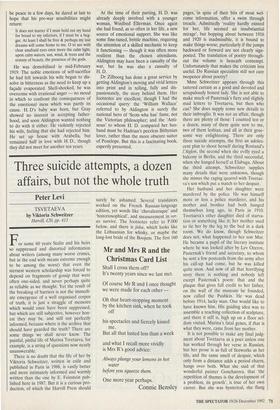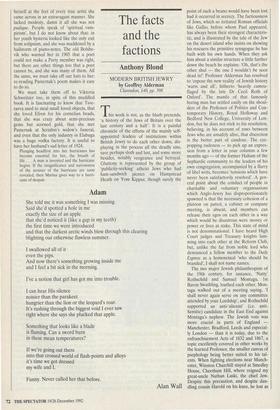Three suicide attempts, a dozen affairs, but not the whole
truth
Peter Levi
TSVETAEVA by Viktoria Schweitzer Harvill, £20, pp. 413 For some 60 years Stalin and his heirs so suppressed and distorted information about writers (among many worse crimes, but in the end with means extreme enough to be among the worst) that even the sternest western scholarship was forced to depend on fragments of gossip that were often one-sided, and never perhaps quite as reliable as we thought. Yet the result of the breaking of barriers is not the immedi- ate emergence of a well organised corpus of truth, it is just a straggle of memoirs which would once have been suppressed, but which are still subjective, however hon- est they may be, and still not perfectly informed, because where is the archive that should have guarded the truth? There are some things we shall never know. The painful, pitiful life of Marina Tsvetaeva, for example, is a string of questions now nearly unanswerable.
There is no doubt that the life of her by Viktoria Schweitzer, written in exile and published in Paris in 1988, is vastly better and more intimately informed and warmly written than the one by E. Feinstein pub- lished here in 1987. But it is a curious pro- duction, of which the Harvill Press should
surely be ashamed. Several translators worked on the French Russian-language edition, yet words like `chevaleresque' and `historiosophical', and measurement in ver- sts survive. The footnotes refer to P.000 below, and there is jislca, which looks like the Lithuanian for whisky, or maybe the long-lost bride of the Boojum. The first 160
pages, In spite of their bits of most wel- come information, offer a swim through treacle. Admittedly 'reality hardly existed for her, life seemed an insubstantial mirage', but hopping about between 1916 and 1920 is inadmissible, it is bound to make things worse, particularly if the jumps backward or forward are not clearly sign- posted. The translation of poetry through- out the volume is beneath contempt. Unfortunately that makes the criticism less useful. Do Russian specialists still not care twopence about poetry?
Mme Schweitzer appears through this tattered curtain as a good and devoted and scrupulously honest lady. She is not able to make much of Pasternak's fiery and slightly mad letters to Tsvetaeva, but then who can? She does supply some new details to their imbroglio. It was not an affair, though there are plenty of those: I counted ten or a dozen, many of them quite new to me, two of them lesbian, and all in their grue- some way enlightening. There are only three suicide attempts, the first an adoles- cent plan to shoot herself during Rostand's l'Aiglon, the second when she evilly eyed a balcony in Berlin, and the third successful, when she hanged herself at Elabuga. About the third attempt, Schweitzer supplies many details that were unknown, though she misses the raging quarrel with Tsvetae- va's son which put a match to her despair.
Her husband and her daughter were murdered by the police. He was himself more or less a police murderer, and his mother and brother had both hanged themselves long ago, in Paris in 1910. Tsvetaeva's other daughter died of starva- tion or something like it; her mother used to tie her by the leg to the bed in a dark room. We do know, though Schweitzer does not, what happened to her son Mur. He became a pupil of the literary institute where he was looked after by Lev Ozerov, Pasternak's friend and secretary, to whom he sent a few postcards from the army after his call-up had come, but he was killed quite soon. And now of all that horrifying story there is nothing and nobody left except Pasternak's poem: that and the plaque that gives full credit to her father, on the wall of the museum he founded, now called the Pushkin. He was dead before 1914, lucky man. One would like to have known him. His guiding idea was to assemble a teaching collection of sculpture, and there it still is, high up on a floor sel- dom visited. Marina's fatal genes, if that is what they were, came from her mother.
It is not possible to make any final judg- ment about Tsvetaeva as a poet unless one has worked through her verse in Russian, but her prose is as full of fireworks as her life, and the same smell of despair, which only from a distance adds a period charm, hangs over both. What she said of that wonderful painter Goncharova. that 'the repetition of themes is the development of a problem, its growth', is true of her own career. But she was hysterical, she flung
herself at the feet of every true artist she came across in an extravagant manner. She lacked modesty, damn it all she was not pudique. People speak of 'spiritual vam- pirism', but I do not know about that: in her youth hysteria looked like the only exit from solipsism, and she was maddened by a hailstorm of piano-notes. The old Bolshe- vik who warned her in 1905 that a poet could not make a Party member was right, but there are other things too that a poet cannot be, and she was many of them. All the same, we must take off our hats to her: re-reading Pasternak's poem makes it easy to do so.
We must take them off to Viktoria Schweitzer too, in spite of this muddled book. It is fascinating to know that Tsve- taeva used to steal small loved objects, that she loved Efron for his cornelian beads, that she was crazy about semi-precious gems but scorned gold, that she met Pasternak at Scriabin's widow's funeral, and even that the only industry in Elabuga was a huge vodka factory. It is useful to have her husband's sad letter of 1924:
Plunging headfirst into her hurricanes has become essential for her, the breath of life . . . A man is invented and the hurricane begins. If the insignificance and narrowness of the arouser of the hurricane are soon revealed, then Marina gives way to a hurri- cane of despair.











































































































 Previous page
Previous page